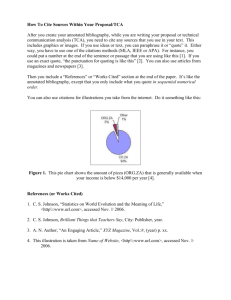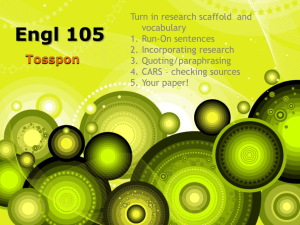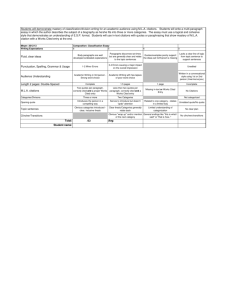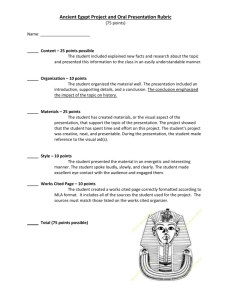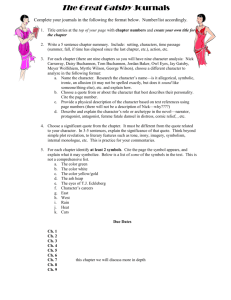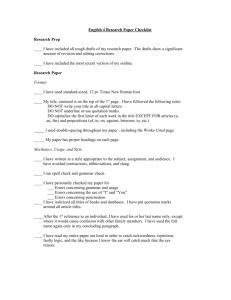Engl105_Wk5
advertisement
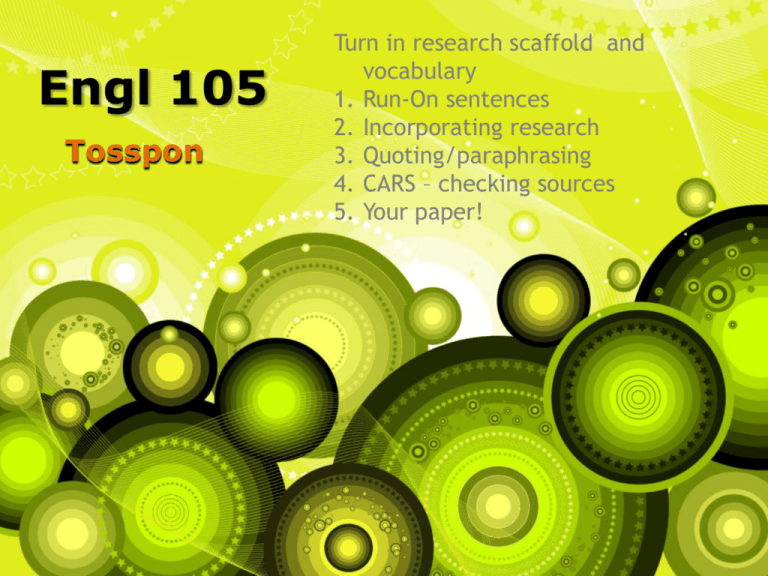
Engl 105 Tosspon Turn in research scaffold and vocabulary 1. Run-On sentences 2. Incorporating research 3. Quoting/paraphrasing 4. CARS – checking sources 5. Your paper! Quick review: Fragments • To be a complete sentence– Subject – Verb – Express a complete thought • Watch for words like “although” and “because”! Review: Run ON • Fragment= incomplete • 2 or more independent clauses (whole sentences) combined incorrectly. bought me a(goal coke1-2 so we went –Kevin Too many ANDS “and”s per Kevin bought me a coke, we went to tosentence) the park together. the park together – Fused • Jammed together punctuation I went to the store with and no bought a barSplice and who did I see there –candy Comma but Kevin who got me coke and so(need • Jammed together withajust a comma we comma went toconjunction!!!) the park together. Game! • Run-On Race • 4-5 Teams: Each team runs this like a relay – Identify Sentence, Fragment, or Run On – Fix the Fragments and Run Ons – I will send you back to your group if the answer is wrong. – Form a “batting order” – the first person cannot go again until every person on the team has been up. • Every 5 questions you complete, your race car will move forward. • First to the end wins! A note about your papers • Your grade is not who you are. – Just because you got a C, doesn’t mean you are a C (or a failure). • #18, 19, 20 – Write a different introduction & conclusion – Look it up in Chpt 4. Write a different TYPE/STYLE of intro from what you already have Incorporating Research Read the paper Highlight/circle each quote Take notes in the margin What kind of hook is it? What is the thesis? what is each main point? Create a Reverse Outline Separate piece of paper Choose 1 article w/ a partner Each Paragraph Each main point Using Quotes/Evidence Throughout story each character’s mindset and outlook.. • Look @ each paragraph 1. Write the thesis @ the top of the paper 2. What is the main point of the paragraph? 3. How does the author use each quote? – How does she introduce the quote? – What quote is used – What does it mean to her paragraph? – How does it prove her thesis? Haymitch, who starts out a drunk… actually becomes very helpful.. As he trains her, he tells Katniss “You’ve got about as much charm as a dead slug” Pg 67 He insults her because he can’t trust himself to care for her, as he knows she will likely be dead in a matter of days It shows that both Haymitch first showed dislike to protect himself from the hurt her death would cause. Quoting • Pg 393 • Quotations must be identical to the original, using a narrow segment of the source. They must match the source document word for word and must be attributed to the original author. – Direct quotation. Jon Krakauer says, “I had been granted unusual freedom and responsibility at an early age, for which I should have been grateful in the extreme, but I wasn’t” (Krakauer, 148). Paraphrasing • Paraphrasing involves putting a passage from source material into your own words. A paraphrase must also be attributed to the original source. Paraphrased material is usually shorter than the original passage, taking a somewhat broader segment of the source and condensing it slightly. – Paraphrase. In Chapter 11 of Into the Wild, Walt, McCandless’s father, remembers an early hike with twelve-year-old Chris. They made it to 13,000 feet before turning back from the 14,256-foot summit in Colorado. Chris did not want to quit, and complained all the way down (Krakauer, 109). Summarizing • Summarizing involves putting the main idea(s) into your own words, including only the main point(s). Once again, it is necessary to attribute summarized ideas to the original source. Summaries are significantly shorter than the original and take a broad overview of the source material. Summary. In Into the Wild, Krakauer seems to be working out his own past and his relationship with his father as well as telling the sad story of Chris McCandless. Because Krakauer, too, is a man of the outdoors, he understands something about the call of the wild. Practice Paraphrase, Quote, Summary • Handout Practice 3. 2. 1. Quotation Punctuation • Period goes AFTER the quote Citation: use 1st thing in the Works Cited page (usually author’s last name or article title) Using Quotes/Paraphrases • Your quote can’t make your point for you. YOU must make your point. • Use a quote, tell the reader WHAT it shows and why. Signal the Use of a Source Read & highlight the handout • Introduce your sources – Dialogue Tags – Phrases – Sentences • Divide your sources • Use Key Phrases Throughout story each character’s mindset and outlook.. Try it on YOUR quote(s) • Fill out a paragraph organizer for YOUR main points/ quotes Haymitch, who starts out a drunk… actually becomes very helpful.. As he trains her, he tells Katniss “You’ve got about as much charm as a dead slug” He insults her because he can’t trust himself to care for her, as he knows she will likely be dead in a matter of days It shows that both Haymitch first showed dislike to protect himself from the hurt her death would cause. Pg 67 Works Cited • Use www.easybib.com • Make sure ALL information is correct • Works Cited goes on its OWN PAGE – Do NOT trust Microsoft! It uses MLA 2007 Plagiarism & Citing Sources Tosspon’s English 105 Heald College Obvious Plagiarism • buying, stealing, or borrowing a paper (including, of course, copying an entire paper or • hiring someone to article from the write your paper for Web); you; and copying large sections of text from a source without quotation marks or proper citation. Cite It • Words or ideas presented in a magazine, book, newspaper, song, TV program, movie, Web page, computer program, letter, advertisement, or any other medium • Information you gain through interviewing or conversing with another person, face to face, over the phone, or in writing • When you copy the exact words or a unique phrase • When you reprint any diagrams, illustrations, charts, pictures, or other visual materials • When you reuse or repost any electronically-available media, including images, audio, video, or other media DON’T Cite It • Writing your own lived experiences, your own observations and insights, your own thoughts, and your own conclusions about a subject • When you are writing up your own results obtained through lab or field experiments • When you use your own artwork, digital photographs, video, audio, etc. • When you are using "common knowledge," things like folklore, common sense observations, myths, urban legends, and historical events (but not historical documents) • When you are using generally-accepted facts, e.g., pollution is bad for the environment, including facts that are accepted within particular discourse communities, e.g., in the field of composition studies, "writing is a process" is a generallyaccepted fact. Must Cite in 2 places: In-text Works Cited Page (also known as ‘parenthetical documentation’) In other words- in parentheses. Your in-text citations work with your bibliography (works cited) page to identify where any quotes or ideas borrowed from another author came from. “References in the text MUST clearly point to specific sources in the list of works cited.” - MLA Handbook for Writers of Research Papers, 6th ed. Works Cited Halio, Jay L., "Elizabethan Age." Grolier Multimedia Encyclopedia. Scholastic Library Publishing, 2006. HF-L High School. 1 Apr 2006 <http://gme.grolier.com>. Life in Elizabethan England. Summer 2005. 31 Mar 2006 <http://renaissance.dm .net/compendium>. Pressley, J. M. "An Encapsulated Biography." Shakespeare Resource Center, February 10, 2005. 3 Mar 2006 <http://www.bardweb.net/man.html>. Shakespeare, William. Romeo and Juliet. New York: Scholastic, Inc., 1969. Thomas, Heather. The Life in Times of Queen Elizabeth I. 23 Mar 2006. 1 Apr 2006 <www.elizabethi.org>. In-text citations: Direct Quote In the body of the paper, it looks like this: When Mercutio is wounded, he screams “A plague on both your houses!” referring to both the Capulets and the Montagues (Shakespeare 70). Works Cited Shakespeare, William. Romeo and Juliet. New York: Scholastic, Inc., 1969. Direct Quotes – Educators are cautioned that “…labels tend to stick, and few people go back later to document a shifting profile of intelligences” (Gardner 139). – Gardner explains that there are difficulties in labeling children with a type of intelligence, including the problem that labels may last, while the assessment may change (139). A. On September 11, 2001, the World Trade Center and the Pentagon were attacked by hijacked airplanes. B. Atta, Binalshibh, al Shehhi, and Jarrah had lived in Germany and were chosen over more established Al Qaeda members due to their exposure to the West and ability to speak English. B was correct: it is specific and not commonly known • How would you cite it? In the text of your paper: • Atta, Binalshibh, al Shehhi, and Jarrah had lived in Germany and were chosen over more established Al Qaeda members due to their exposure to the West and ability to speak English (National Commission 160). In the Works Cited: National Commission on Terrorist Attacks Upon the United States. The 9/11 Commission Report. New York: W.W. Norton, 2004. Which of THESE do you need to cite? A. “The science labs at East St. Louis High School are 30 to 50 years outdated.” B. When public schools were segregated, conditions were not equal. How would you cite it? In-body: • “The science labs at East St. Louis High School are 30 to 50 years outdated” (Kozol 27). In the Works Cited: Kozol, Jonathan. Savage Inequalities: Children in America’s Schools. New York: HarperCollins, 1991. Print. Good Sources/Bad Sources • Do NOT use wikipedia as a cited source. • Sources that end in .edu or .gov are more reliable. • News agencies often end in .com • Beware of .org, .com, and .net websites. – Sometimes can be used to show people’s opinions. Should NOT be used for facts unless reputable source such as news site. CARS Is your web source • Credible • Accurate • Reliable • Supported • See handout, analyze 1 source YOU used. • Sometimes you may use a non-credible source, if you are quoting an opinion and state it as such in your paper. Peer Revision: Compare/Contrast • Use the Handout • Remember to respond (questions 1721) – Author- you are asked to write a different STYLE of intro and a different STYLE of conclusion (see chpt 4) • If you used a personal story, try using a quote! If you used a call to action, try using an anecdote! Computer Room Assignments 1. CARS worksheet (due today) 2. Research Scaffold (due today) • Title of the article • Author of the article • Source of the article • Date the article published 3. Review your Narrative grade (emailed to you if you submitted on time) Begin working on Grammar log Homework: Tuesday • Compare/Contrast 1st Draft DUE @ beginning of NEXT MEETING (50 points) • Grammar Log for Narrative Homework: Thurs • Compare/Contrast Final Draft email to ttosspon@gmail.com before class! • If you email it on/before the 27th you will get 10 points credit. • Grammar Log for Narrative
